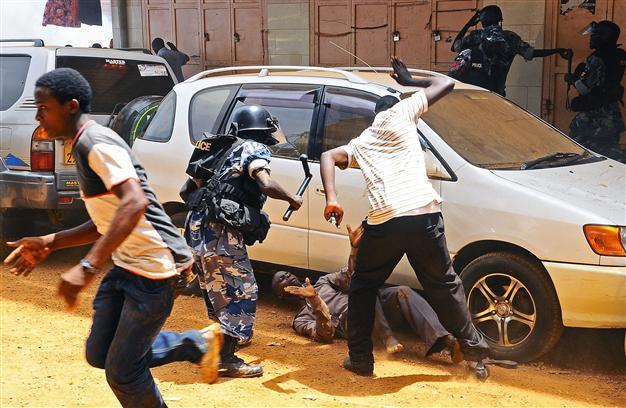Uganda protest leader in court after police death
KAMPALA - Associated Press

A man is beaten during an opposition rally in Kampala, Uganda on March 21, 2012. AFP photo
Uganda's top opposition leader pleaded not guilty Wednesday to charges of convening an unlawful assembly in a case stemming from the killing of a policeman in violent street clashes last week.
In tense scenes that threatened to turn violent, heavily armed police blocked Kizza Besigye's supporters from following him to a magistrate's court. Besigye was charged alongside some of his associates, two of whom were arrested for attempting to walk to court and then ferried on a police truck to the courtroom.
Besigye and the co-accused pleaded not guilty and were released on bail.
Besigye and a group of opposition politicians calling themselves activists for change have since last year been staging demonstrations against a government they accuse of mismanaging the economy. Ugandan police say such political demonstrations disrupt businesses and often use tear gas and force to break them up.
The so-called "Walk to Work" rallies, which are meant to highlight the rising cost of living in Uganda, have tapped a vein of resentment among urban residents who see the government as corrupt and out of touch with ordinary people.
Besigye is one of scores of Ugandans arrested after a policeman was hit and killed last week by what the authorities said was a rock thrown by one of Besigye's supporters.
The opposition has denied responsibility, saying the policeman was likely killed by a stray bullet form a colleague's gun. A coroner's report said the policeman was hit by a "flying, blunt object." Ugandan President Yoweri Museveni said in the aftermath of the killing that those responsible would "pay dearly." Two days later Ugandan police and security officials raided a shopping center in downtown Kampala and arrested 100 people they suspected of possible involvement in the killing. Some claimed they were tortured during detention.
The swoop, defended by the authorities as necessary to rid the capital of people they describe as hooligans, was condemned by opposition politicians who said it reminded them of the fearsome tactics employed by the troops of former Ugandan dictators.
Besigye has never been able to walk alone, with hundreds of his supporters joining him as soon as he steps out of his house. Independent analysts say the chances of violence would be minimal if the police simply ignored him.
"I don't think Besigye will ever be allowed to walk," said Nicholas Sengoba, a political analyst based in Kampala. "The government is sure that there are many people who are dissatisfied and who would join Besigye if he walked. Chances are that the crowds will always get big, because the town is full of unemployed, dissatisfied people."
